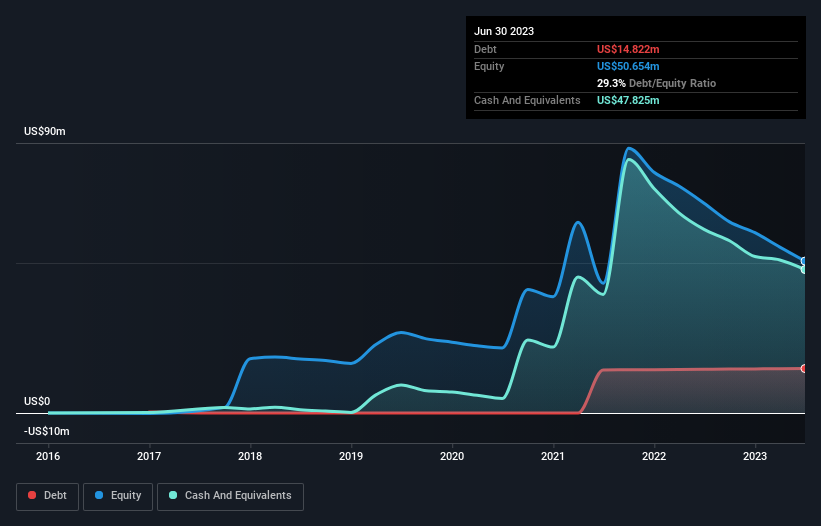Howard Marks put it nicely when he said that, rather than worrying about share price volatility, 'The possibility of permanent loss is the risk I worry about... and every practical investor I know worries about.' It's only natural to consider a company's balance sheet when you examine how risky it is, since debt is often involved when a business collapses. We can see that INmune Bio, Inc. (NASDAQ:INMB) does use debt in its business. But the more important question is: how much risk is that debt creating?
When Is Debt A Problem?
Generally speaking, debt only becomes a real problem when a company can't easily pay it off, either by raising capital or with its own cash flow. If things get really bad, the lenders can take control of the business. However, a more common (but still painful) scenario is that it has to raise new equity capital at a low price, thus permanently diluting shareholders. Of course, the upside of debt is that it often represents cheap capital, especially when it replaces dilution in a company with the ability to reinvest at high rates of return. When we examine debt levels, we first consider both cash and debt levels, together.
Check out our latest analysis for INmune Bio
What Is INmune Bio's Debt?
The chart below, which you can click on for greater detail, shows that INmune Bio had US$14.8m in debt in June 2023; about the same as the year before. However, its balance sheet shows it holds US$47.8m in cash, so it actually has US$33.0m net cash.

How Strong Is INmune Bio's Balance Sheet?
We can see from the most recent balance sheet that INmune Bio had liabilities of US$13.1m falling due within a year, and liabilities of US$6.01m due beyond that. Offsetting this, it had US$47.8m in cash and US$2.05m in receivables that were due within 12 months. So it can boast US$30.8m more liquid assets than total liabilities.
This excess liquidity suggests that INmune Bio is taking a careful approach to debt. Because it has plenty of assets, it is unlikely to have trouble with its lenders. Succinctly put, INmune Bio boasts net cash, so it's fair to say it does not have a heavy debt load! The balance sheet is clearly the area to focus on when you are analysing debt. But it is future earnings, more than anything, that will determine INmune Bio's ability to maintain a healthy balance sheet going forward. So if you want to see what the professionals think, you might find this free report on analyst profit forecasts to be interesting.
Since INmune Bio doesn't have significant operating revenue, shareholders may be hoping it comes up with a great new product, before it runs out of money.
So How Risky Is INmune Bio?
Statistically speaking companies that lose money are riskier than those that make money. And we do note that INmune Bio had an earnings before interest and tax (EBIT) loss, over the last year. Indeed, in that time it burnt through US$13m of cash and made a loss of US$27m. But at least it has US$33.0m on the balance sheet to spend on growth, near-term. Even though its balance sheet seems sufficiently liquid, debt always makes us a little nervous if a company doesn't produce free cash flow regularly. There's no doubt that we learn most about debt from the balance sheet. But ultimately, every company can contain risks that exist outside of the balance sheet. For example INmune Bio has 3 warning signs (and 1 which is a bit concerning) we think you should know about.
When all is said and done, sometimes its easier to focus on companies that don't even need debt. Readers can access a list of growth stocks with zero net debt 100% free, right now.
New: AI Stock Screener & Alerts
Our new AI Stock Screener scans the market every day to uncover opportunities.
• Dividend Powerhouses (3%+ Yield)
• Undervalued Small Caps with Insider Buying
• High growth Tech and AI Companies
Or build your own from over 50 metrics.
Have feedback on this article? Concerned about the content? Get in touch with us directly. Alternatively, email editorial-team (at) simplywallst.com.
This article by Simply Wall St is general in nature. We provide commentary based on historical data and analyst forecasts only using an unbiased methodology and our articles are not intended to be financial advice. It does not constitute a recommendation to buy or sell any stock, and does not take account of your objectives, or your financial situation. We aim to bring you long-term focused analysis driven by fundamental data. Note that our analysis may not factor in the latest price-sensitive company announcements or qualitative material. Simply Wall St has no position in any stocks mentioned.
About NasdaqCM:INMB
INmune Bio
A clinical-stage immunology company, focuses on developing drugs to reprogram the patients innate immune system to treat disease in the United States.
Excellent balance sheet with moderate risk.
Market Insights
Community Narratives



